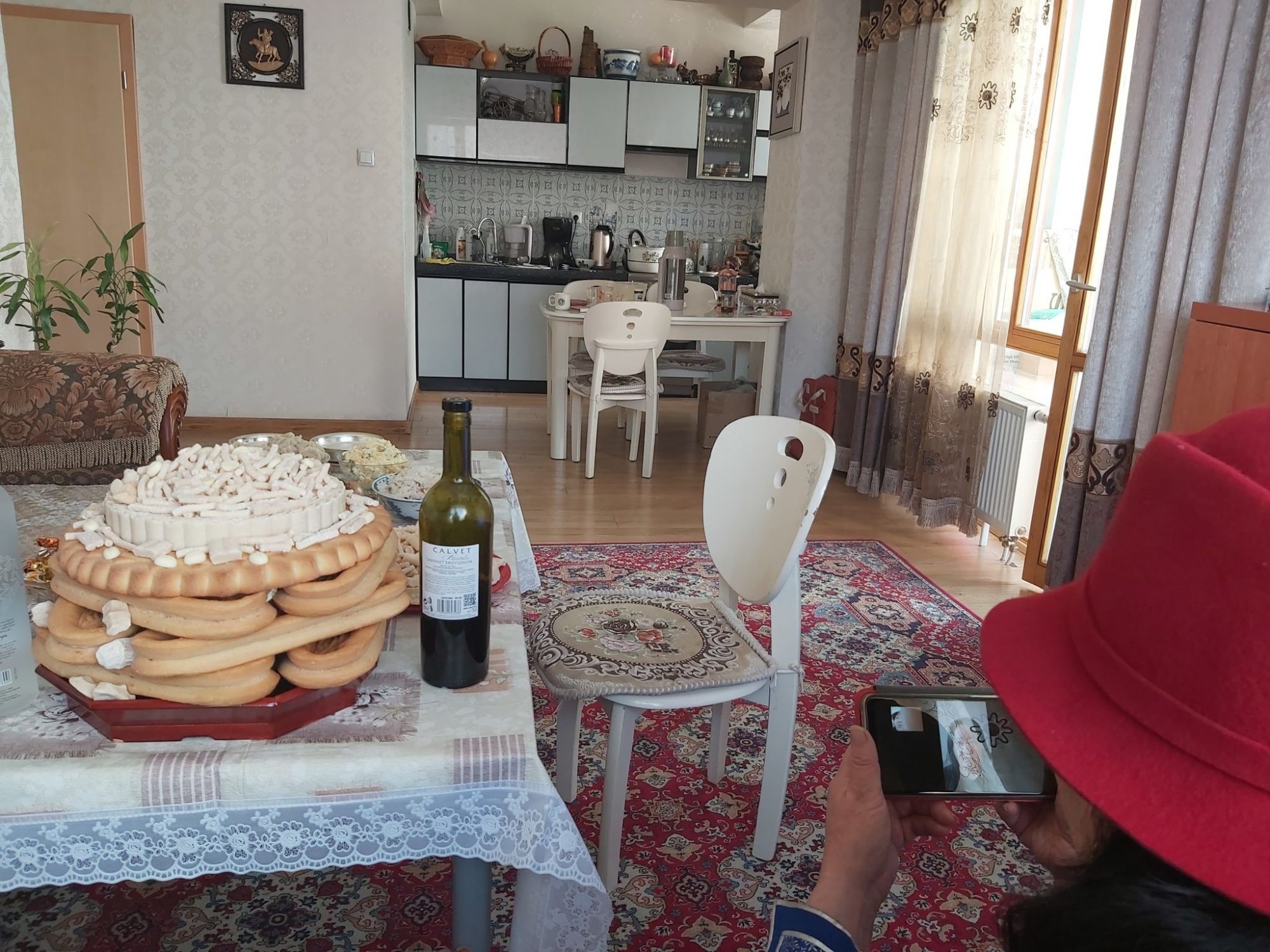Коронагийн үеийн Цагаан сар
Урьд өмнө нь Монголчууд Цагаан сарыг тэмдэглэхгүй гэдгийг төсөөлж ч чаддаггүй байлаа. Энэ бол Монголчууд төрөл садан, ойр дотнын хүмүүстэйгээ уулзаж, ерөөлтэй сайхан үгс хэлэлцдэг ганц баяр. Залуу хүмүүс ядаж л жилдээ нэг удаа Цагаан сараар ахмадуудындаа очин, гэр бүлээрээ цугладаг.
Монголчууд Цагаан сарын эхний 3 өдөр өглөөнөөс үдэш болтол ах дүү, хамаатан садныхнаараа хэснэ. Арав, хориулаа нэг жижигхэн гэр, эсвэл жижиг байранд цуглах нь байдаг л зүйл. Зай талбай хэдий давчуу ч бүгд эвээ олоод л багтацгаана. Цагаан сарын мэндлэх зан үйл бэлгэдлийн шинжтэй, энгийн үеийнхээс их өөр: Тухайлбал, насаар дүүмэд хүн нь ахмад хүнийхээ тохойн доороос өргөн амар мэндийг нь асууна. Энэ бол хүндэлж буйн илрэл. Ахмад нь гараа дээр нь тавиад, дух эсвэл хоёр хацар дээр нь үнсэнэ. Энэ нь корона тархсан энэ цаг үед халдвар тархаах өндөр эрсдэл үүсгэнэ. Тиймээс ч ноднин жил анх удаагаа Цагаан сарыг тэмдэглэхгүй байх шийдвэрийг засгийн газраас гаргасан юм. Тэгснээр вирус дотооддоо халдварлахаас амжилттай сэргийлж, Монгол улс нэлээд удаан хугацаанд зөвхөн гаднаас зөөвөрлөгдөн орж ирсэн тохиолдлуудаар хязгаарлагдаж байлаа.
Харин өвөл эхлэхэд байдал өөрчлөгдөж, дотоодод халдвар нэмэгдэх болов. Тиймээс засгийн газар Цагаан сарыг энэ жил бас тэмдэглэхгүй байх шийдвэр дахин гаргахад ихэнх нь хүлээн зөвшөөрч, эсэргүүцэх хүн бараг байсангүй.
Гэсэн ч хүмүүс уламжлал ёсоор гэр гэртээ идээ боовоо засаж, салад, буузаа хийцгээв. Үндэсний дээл хувцас, малгайгаа өмсөөд хамаатан садантайгаа утсаар болон видео дуудлагаар зайнаас мэндчиллээ.
Угаас вирус тархаж эхэлснээс хойш амьд биен харилцаа эрс багасаж, фейсбүүк зэрэг сошал сүлжээ улам чухал болсон. Хэвлэл мэдээллийн хэрэгслээр ч цахимаар золгохыг уриалж байв. Тиймээс хөгшчүүл маань яг л цагаан сарын өдрүүдийг зочноор даруулж өнгөрүүлдэг байсны адил утсаар ярьж, видео дуудлага хүлээн авсаар завгүй өнгөрөөв.
Монголчуудын он тоолол, сарны хуанлийн дагуу бол одоо Үхэр жил гарч буй. Өнгөрсөн жил хулгана жил байлаа. Сошал сүлжээгээр “Хулгана жилд хоол хүнсээ цуглуулаад нүх рүүгээ бушуухан гүйж ороод яг л хулгана шиг амьдарлаа. Одоо харин үхэр жилд үхэр шиг талаар нэг тарж бэлчих болтугай” гэсэн хошин яриа тарж байлаа. Хүссэн ёсоор Цагаан сарын хөл хорио ч тавигдаж, Улаанбаатар хотын гудамж хүн зоноор бялхаж эхэлжээ.
Tsagaan Sar, das mongolische Neujahrsfest in Zeiten von Corona
Das mongolische Neujahrsfest zu verpassen ist für die Mongolen in normalen Zeiten undenkbar. Denn Tsagaan Sar ist das einzige Fest, bei dem man alle seine Verwandten und engen Freunde trifft und schöne, freundliche Worte wechselt. So kommen die jungen Leute zumindest einmal im Jahr zu ihren älteren Verwandten und man bleibt als Familie in Kontakt.
Während der ersten drei Tage des Festes gehen alle von früh morgens bis spät abends Verwandte besuchen. Typischerweise sitzen dann zehn bis zwanzig Leute in einer kleinen Jurte oder einer kleinen Stadtwohnung zusammen. Es ist eng, aber irgendwie finden schon alle Platz.
Die gegenseitige Begrüßung folgt während Tsagaan Sar einer besonderen, rituellen Form. Der Jüngere stützt mit seinen Händen symbolisch die Ellbogen des Älteren, was ein Zeichen der Verehrung ist, und fragt nach dessen Wohlbefinden. Der Ältere legt seine Hände auf die Unterarme des Jüngeren und küsst ihn oder sie auf beide Wangen oder auf die Stirn.
In Zeiten von Corona stellt diese Form der Begrüßung ein hohes Infektionsrisiko dar. Daher hat die Regierung bereits im vergangenen Jahr alle Neujahrs-Feiern untersagt. So wurde erfolgreich verhindert, dass sich das Virus im Inland ausbreitet, und lange Zeit blieb das Infektionsgeschehen in der Mongolei auf sogenannte „importierte Fälle“ beschränkt.
Leider änderte sich das jedoch mit Anbruch des Winters. Seitdem gibt es auch hier in der Mongolei immer mehr Fälle. Die Regierung hat daher beschlossen, die Neujahrs-Feiern auch in diesem Jahr wieder zu verbieten. Die allermeisten Mongolen zeigten dafür Verständnis, Proteste gab es kaum.
Trotz des Besuchsverbots haben die meisten Familien zuhause traditionell aufgetischt: Eine Kuchenskulptur, Salate und gedämpfte Maultaschen. Gekleidet in Deel und Hut begrüßte man die Verwandten am Telefon oder per Video-Anruf aus der Distanz.
Seit Ausbruch der Pandemie reduzieren die Mongolen ihre sozialen Kontakte deutlich. Umso wichtiger wurden daher die sozialen Netzwerke wie Facebook. In den Medien wurde dafür geworben, sich an Tsagaan Sar auf diese Art Kommunikation zu beschränken. Viele ältere Leute waren daher auch an diesen Tagen des Neujahrsfestes den ganzen Tag beschäftigt: nur eben mit Telefonaten und Video-Anrufen statt mit Gästen.
Nach dem mongolischen Mondkalender hat nun das Jahr des Ochsen begonnen. Das letzte Jahr war das Jahr der Maus. In den sozialen Medien machte daher ein Witz die Runde: Im vergangenen Jahr lebten wir alle tatsächlich wie die Mäuse, die nur zum Futterholen kurz aus ihren Höhlen kommen, um dann gleich wieder darin zu verschwinden. Alle hoffen, dass wir im neuen Jahr des Ochsen wieder wie die Rinder leben können, die zusammen auf offener Weide grasen.
Tatsächlich ist nun auch der Tsagaan-Sar-Lockdown bis auf weiteres vorüber und die Straßen in Ulaanbaatar füllen sich wieder mit Menschen.
(Die Autorin selbst hat ihren Text aus dem Mongolischen übersetzt.)
Lunar New Year celebrations during the Covid pandemic
Mongolians could never imagine that Lunar New Year couldn’t be celebrated. This is the only holiday when Mongolians meet their relatives, their nearest and dearest, and greet each other with their best wishes. For young people, it offers a chance at least once a year to visit the elderly during the Lunar New Year and gather as a family.
During the first three days of the Lunar New Year, Mongolians go around visiting their relations from dawn to dusk. It can happen that ten or even twenty people gather in a yurt or a flat in the city. Even though the space is tight, all manage to squeeze in peacefully.
Lunar New Year greetings are different from ordinary ones in carrying symbolic meaning: for example, the younger person greets the older person by supporting the elder person from underneath his/her elbows. This is a sign of respect. The elder person places his arms on top of the other’s arms and kisses them on either their forehead or cheeks.
This would create a high risk for spreading the infection during this corona virus time. Therefore, last year for the first time the government made a decision not to allow Lunar New Year celebrations. In that way, Mongolia successfully prevented the virus spreading domestically and for a long time cases were limited to only those brought in from outside the country.
However, when winter arrived, the situation changed and internal cases started to increase. Therefore, when this year the government again made a decision not to allow Lunar New Year celebrations, the majority have accepted this and hardly anyone protested.
Even so people followed their tradition and laid their tables with seasonal delicacies and made salads and dumplings. They wore their traditional deli gowns and headwear and virtually greeted their relatives via telephones or video calls.
Consequently, face to face interaction was dramatically reduced since the start of the virus spread. Social networks such as facebook became ever more important. Even media outlets appealed for digital greetings. Therefore, our elderly have been busy receiving phone and video calls just as in the Lunar New Year celebrations when people used to flock to their homes.
According to the Mongolian calendar and the lunar calendar, the year of the ox is now beginning. Last year was the year of the mouse. On social networks jokes were spreading saying that in the year of the mouse we lived like mice rushing to our holes after gathering things to eat. But now we may spread widely over the plains in the year of the ox, just like cows do.
And, as was hoped, Lunar New Year restrictions have been lifted and the streets of Ulaanbaatar are full of people.
(Translated from Mongolian by a translation company.)
Teilen












